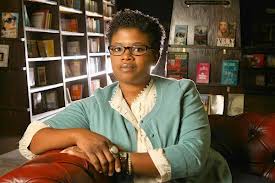I’ve always been fascinated with plantation tours. I’ve even read books about how the owners of such homes alter history just a bit to make tourists more comfortable. Maybe you’ve read past posts on this blog and you’re already familiar with my talk on the subject.
When I began grad school a few years ago, I began work on my own fiction story about a plantation tour guide. I worked on it for sometime, discussed it in writer workshops, and continued to make edits. Well, then I came across Attica Locke’s novel, The Cutting Season and noticed many of my “original” ideas in print. Because of this, the novel was initially a challenging read for me. I don’t know if it’s okay for me to admit that here, but . . .anyway, I guess I have to lay my story idea to rest now. Mine wouldn’t have been a murder mystery by far, but . . . Anyway, on with the review.
“This whole thing came to me because I went to a wedding at the Oak Alley Plantation in Vacherie, La., in 2004. And I had never been on a plantation before — probably, if I’m being frank, would never have gone on a plantation. We were bused in from New Orleans. And I don’t think that I was psychologically prepared for that experience.” – Attica Locke
My Quickie Summary: A past and present-day murder occurs on plantation grounds and it’s left to Caren, a descendant of slaves and former grounds residents, to put the pieces together.
Their Summary: Just after dawn, Caren walks the grounds of Belle Vie, the historic plantation house in Louisiana that she has managed for four years. Today she sees nothing unusual, apart from some ground that has been dug up by the fence bordering the sugar can fields. Assuming an animal has been out after dark, she asks the gardener to tidy it up. Not long afterwards, he calls her to say it’s something else. Something terrible. A dead body. At a distance, she missed her. The girl, the dirt and the blood. Now she has police on site, an investigation in progress, and a member of staff no one can track down. And Caren keeps uncovering things she will wish she didn’t know. As she’s drawn into the dead girl’s story, she makes shattering discoveries about the future of Belle Vie, the secrets of its past, and sees, more clearly than ever, that Belle Vie, its beauty, is not to be trusted.
Thoughts on the Book (no spoilers): This book is definitely filled with some highlight worthy literary descriptions. I begin with that. The writing alone earns this book proper accolades. However, another reviewer mentioned this book was a page turner and that you’re dying to know who the novel’s murderer is and I just didn’t feel that way. What drove this novel for me were the subplots. I cared about Caren’s background, history, relationships with other characters, and her life in general. I didn’t care about the murder or who the prime suspect was. By the time I reached the novel’s conclusion, I just didn’t feel like I received an ending worthy of what I’d read.
Excerpt (In this scene Caren interrogates her daughter assuming that the girl may know something about the plantation crime):
“This afternoon,” she said, speaking carefully and deliberately, drawing a line of emphasis under each word, “when the police asked if you saw or heard anything last night, you were telling the truth, weren’t you, ‘Cakes?”
Morgan mumbled something.
“Morgan?”
“I said yes.” She rolled her eyes, this new thing she’d picked up at school that Caren couldn’t stand. She wanted to swat her little legs to get her attention, the way she might have when Morgan was just a tot and danger meant something as real and present as a lick of fire burning on the stove. But her daughter wasn’t a preschooler anymore. She couldn’t put her in a corner or physically wrest the truth out of her. At this stage, the two of them, mother and daughter, were left with the crudeness of language, the imprecision of words. “What is going on, Morgan?” she said. “Why do you have blood on your shirt?” Her voice was shrill. She was yelling again.

Locke’s Preparation for the Book: I did do a lot of research about plantations and about the sugar industry in that particular region of the country. I knew the basics. The arc of slavery and the civil war, but again, Louisiana and New Orleans have their own very specific history, and I wanted to read as much as I could before writing about the area. (Read full interview . . .)
Overall, great writing, but not necessarily a book I’d recommend to friends as a “must read” or “Best of 2012.” Happy reading, y’all!

I will consider this. It sounds like an interesting premise. It sounds like a good mystery.
LikeLike